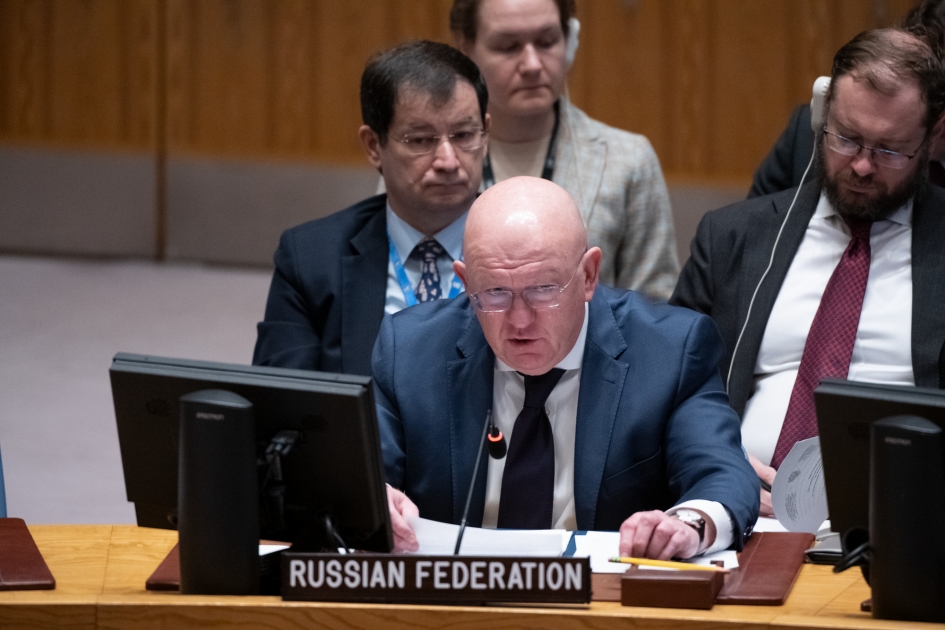Statement by Permanent Representative Vassily Nebenzia at UNSC briefing on the political and humanitarian situation in Syria
Mr.President,
We thank SESG Pedersen and Ms.Edem Wosornu for their review of the political and humanitarian situation in the Syrian Arab Republic.
The situation on Syrian soil remains extremely tense. Among other things, this is a result of the unprecedented escalation of the Palestinian-Israeli conflict. The current increase in tension on the Syrian-Israeli border is due to active external interference combined with illegal foreign military presence in the north and northeast of the Syrian Arab Republic. This month, the Israeli Air Force has repeatedly carried out airstrikes on Syrian territory, once again targeting important civilian infrastructure such as the Damascus and Aleppo international airports. This puts at real risk the lives of innocent people and the safety of international air traffic, not to mention the consequences for the work of the UN air service, which also delivers humanitarian aid.
Moreover, on October 26, US forces, under orders from President Biden, struck two sites near the town of Abu Kemal in eastern Syria. Washington said that the attack was undertaken as part of the exercise of the so-called right to "self-defense" in the American manner, thousands of kilometers away from the US territory. Such illegitimate actions by Washington are nothing but a gross violation of Syria's sovereignty and the norms of international law. In the context of an acute escalation of the situation in the Palestinian-Israeli conflict zone, such forceful actions are fraught with extremely dangerous consequences, as they could provoke an armed escalation throughout the region. That must never be allowed to happen. The American representative devoted most of his statement (in his customary manner) to accusations against Syria and Russia. I should like to emphasize that, unlike the United States, we launch strikes at Hayat Tahrir al-Sham, a UNSC-listed terrorist organization.
Washington's interference in internal Syrian affairs is clearly confirmed by the renewed Arab-Kurdish clashes in cross-Euphrates area, which led to the deaths of more than 100 people, and the protests in the province of Suwayda, during which economic demands turned into outright political ones. Against this background, the United States and its Western allies, which occupy significant territories in the northeast and south of the SAR and are involved in the smuggling of Syrian oil and grain, are fueling political tensions under economic pretexts by providing the Kurds with weapons, which are then used against the native Arab tribes living in the cross-Euphrates (i.a. to create threats along the Syrian-Turkish border). Helping with that is Israeli air force, which has expanded the geography of its arbitrary air strikes in Deir ez-Zor province.
Against this backdrop, it is positive that Damascus develops multifaceted interaction with Arab countries, including economic cooperation and political normalization. Building ties with other extra-regional actors is also of great importance for Syria's exit from the isolation, which was imposed artificially.
At the political track, we still see no alternative to promoting the Syrian-owned and Syrian-led political process with the assistance of the United Nations, in strict compliance with Security Council resolution 2254 and with respect for the sovereignty, independence, unity and territorial integrity of the country.
In that regard, we are convinced of the need to continue direct inter-Syrian dialogue, the main platform for which has been and remains the Constitutional Committee (CC). This process should not be hindered by any other initiatives that are not supported by all parties. At the same time, we continue to believe that fundamental decisions on the venue for the next round of consultations of the CC should be taken by the Syrians themselves, without external interference.
Attempts to present other venues as possible alternatives are groundless.
No efforts are being made to resolve the situation with the remaining terrorist enclave in Idlib. After the closure of the cross-border mechanism, the terrorists of Hayat Tahrir al-Sham have effectively blocked humanitarian access to the de-escalation zone, openly taking advantage of the needs of the civilian population. Despite the voluntary and sovereign permission of the Syrian government to use the Bab al-Hawa border crossing for the delivery of humanitarian aid, the first convoy was only able to pass through on September 19 (a total of 159 trucks). This was done on the basis of a separate agreement between UN OCHA and some humanitarian aid office in Idlib, which agreed to receive aid independently of Damascus and was under the control of the militants. There is still no access across the line of contact, which we consider unacceptable.
We assume that, after the non-renewal of Security Council resolution 2672, international humanitarian assistance can be carried out in strict accordance with the guiding principles of humanitarian assistance as set out in UNGA resolution 46/182. That is, in close coordination and exclusively in agreement with Damascus.
Thank you.
